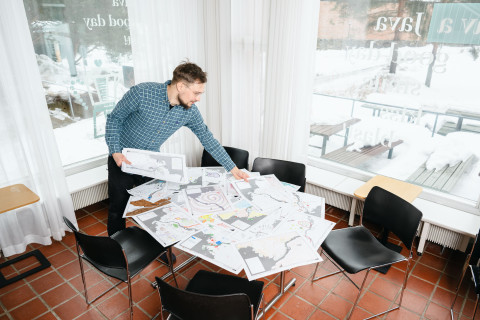Cities are places coinhabited by humans and other organisms – shared and co-created. They are filled with spaces and resources that no one owns, but where people come together to do interesting and meaningful things. Funded by the Kone Foundation, the University of Eastern Finland is currently implementing a project that explores shared city space and people’s own, everyday places in it.
“In our study, we use the notion of ‘the commons’ in an effort to understand urban coexistence and livelihoods from the perspective of shared resources and collectively maintained opportunities. We are exploring shared wealth in the context of the major changes in economic thinking taking place in the 2020s,” Postdoctoral Researcher Tuomo Alhojärvi explains.
As part of the study, a participatory mapping project is organised in Joensuu, inviting everyone to describe their everyday places and their relationship to shared city space.
“The goal is to create a diverse, hand-drawn atlas of the various ways in which individuals and groups of people experience shared city space. We also want to hear about people’s future hopes for their city.”
The study also explores the significance of paper maps in the post-digital era: how physical maps offer opportunities to gather around urban experiences.
Open to everyone, a map exhibition and workshop will be organised in the Muikku Auditorium of the Joensuu City Library on 11–16 March. The event, titled as “Our Joensuu: Own Places, Shared Spaces”, showcases maps drawn by students attending the city’s schools. Using maps, exhibition visitors will also have the opportunity to share their relationship with the city and contribute their knowledge, experiences and views of the city’s shared resources and opportunities.
“Nature protected under Everyone’s Rights, or knowledge that is shared and co-created, for example, can be regarded as a commons. No one has ownership of them; yet they can feel personal and important to everyone.”
The event will pay special attention to vivid urban nature, everyday social infrastructure and the constantly evolving place names as forms of shared wealth.
“Nature, collaboration and language serve as excellent examples of the commons, as without them, we would be nothing. Through maps, we aim to outline their extent and diversity, without forgetting possible conflicts arising from sharing and co-inhabiting the city,” Alhojärvi says.

Maps and discussion on our shared city
The Our Joensuu: Own Places, Shares Spaces event is both an exhibition and an open workshop. Data is collected anonymously and participation in the study is voluntary. According to Alhojärvi, visitors are also welcome to just observe and look around. Although the event will collect data for research, that is not the only goal of the project.
“We hope the event will bring people together to draw and explore maps, and that the maps will spark discussion on issues related to the city space.”
As part of the event, there will also be four discussion sessions in Finnish that delve deeper into the themes of the maps. The invited speakers are researchers of city space, as well as civic actors actively shaping it.
The study is also a way of developing methods for participatory mapping.
“It is clear that digital geographic information is here to stay. However, in this event, paper maps are making a comeback, although in a new form: as an element that brings together the diversity of people. They offer a flexible, easily approachable tool for thinking about a familiar city from a fresh perspective.”
Alhojärvi points out that the purpose is not to idealise everything that is common and shared, but also to highlight possible conflicts and discord.
“We are navigating our shared city with very different maps. When experiences and perspectives about the city are brought together, we can gain deeper insight into difference, which is an essential characteristic of a shared space.”
The study seeks to enhance understanding of the commons in Joensuu, and of the richness of experiencing the urban environment. It creates knowledge about how perceptions related to ownership and sharing evolve, as well as how these changes are manifested in the city space of Joensuu.
Information about the discussion sessions and the event timetables can be found (in Finnish only) at: https://koneensaatio.fi/hanke/omistuksenjalkeisyys/#tapahtumat
The participatory mapping project of Joensuu constitutes part of the Post-ownership as an Interpretation and Experience of Economic Change project (2022–2025) funded by the Kone Foundation.




